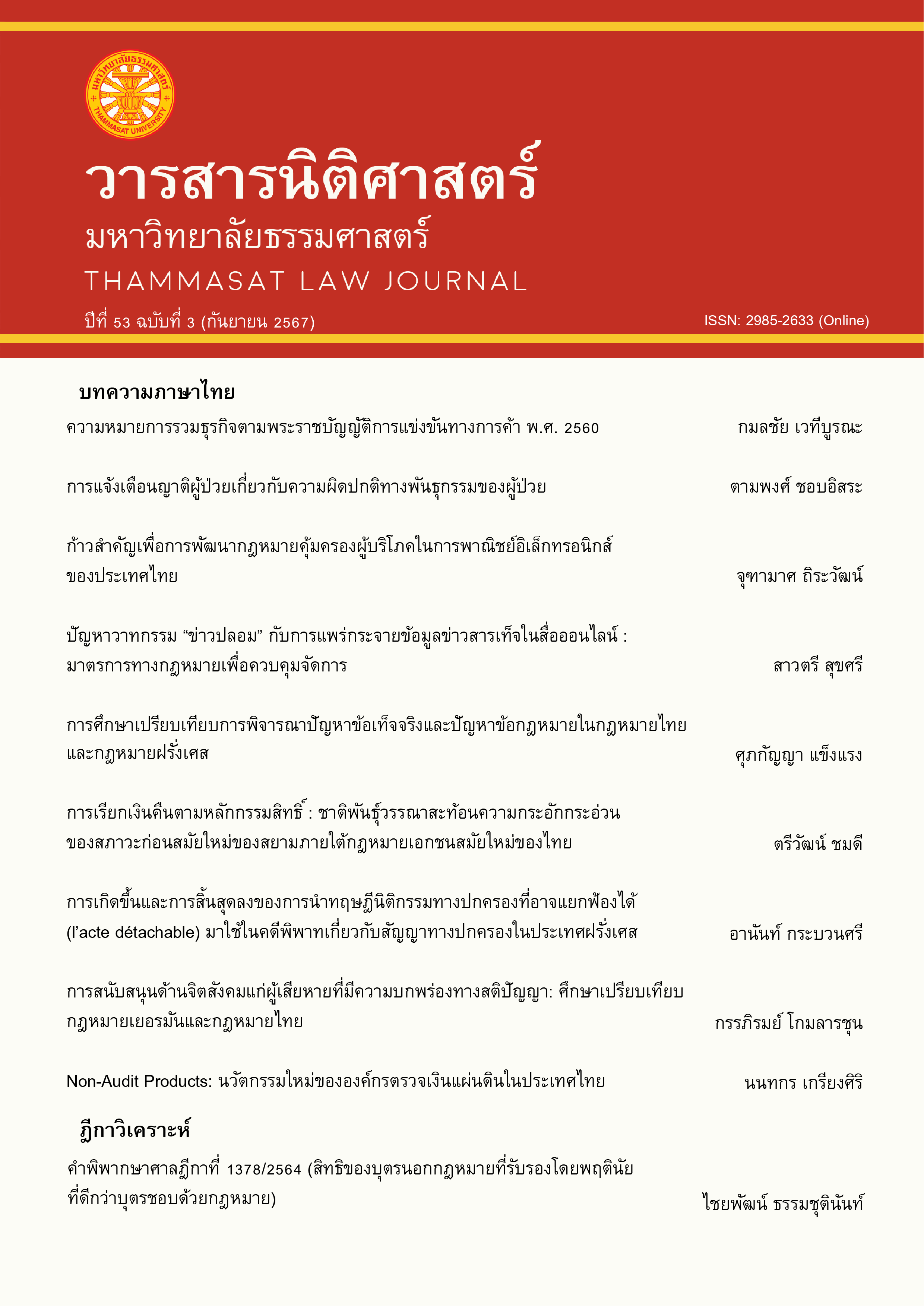ปัญหาวาทกรรม “ข่าวปลอม” กับการแพร่กระจายข้อมูลข่าวสารเท็จในสื่อออนไลน์ : มาตรการทางกฎหมายเพื่อควบคุมจัดการ
คำสำคัญ:
ข่าวปลอม, ข้อมูลข่าวสารเท็จ, สื่อสังคมออนไลน์, เสรีภาพสื่อมวลชนบทคัดย่อ
กระแสข่าวปลอม (Fake News) ยุคใหม่ที่มีจุดเริ่มมาจากการเลือกตั้งประธานาธิบดีสหรัฐอเมริกาเมื่อปี ค.ศ. 2016 ทำให้นานาประเทศตระหนักว่าการเผยแพร่ข้อมูลข่าวสารเท็จไม่ได้ส่งผลกระทบเพียงกับปัจเจกชนคนใดคนหนึ่งเช่นในอดีต หากแต่สามารถส่งผลต่อสังคม ระบบเศรษฐกิจ การเมือง ไปจนถึงระบอบประชาธิปไตยได้ และปัจจัยสำคัญที่ก่อให้เกิดผลลัพธ์นี้ก็คืออินเทอร์เน็ต และสื่อสังคมออนไลน์ (Social Media) ที่ทำให้การส่งต่อและแบ่งปันข้อมูลข่าวสารทำได้รวดเร็วและกว้างขวางขึ้น ประเทศทั้งหลายต่างเร่งหามาตรการต่าง ๆ เพื่อจัดการกับการแพร่กระจายนี้ ซึ่งหมายรวมถึงมาตรการทางกฎหมาย ประเทศไทยเองก็ประสบปัญหานี้เช่นกัน โดยที่ผ่านมานอกจากการตั้งศูนย์ต่อต้านข่าวปลอมโดยรัฐ และการสร้างเครือข่ายเพื่อตรวจสอบข้อเท็จจริง (Fact Checking) โดยภาคประชาชนแล้ว ยังมีกระบวนการสร้างความรู้เท่าทันสื่อ (Media Literacy) ให้ประชาชนที่จัดขึ้นโดยองค์กรต่าง ๆ ด้วย อย่างไรก็ตาม ในแง่ของมาตรการทางกฎหมาย ยังคงมีปัญหาว่าประเทศไทยมีกฎหมายที่ใช้จัดการกับการแพร่กระจายของข้อมูลเท็จในสื่อออนไลน์โดยเฉพาะหรือไม่ อย่างไร ถ้ามีอยู่แล้ว กฎหมายนั้นมีประสิทธิภาพเพียงใด หรือมีประเด็นใดที่รัฐต้องคำนึงถึง โดยเฉพาะอย่างยิ่งถ้าการบังคับใช้กฎหมายนั้นอาจกระทบสิทธิเสรีภาพของประชาชน และเสรีภาพสื่อในการเสนอข่าวสารบนสื่อออนไลน์
จากการศึกษาพบว่า หลายประเทศยังคงเลือกใช้มาตรการทางวิชาชีพในการสร้างมาตรฐานเพื่อ “กำกับดูแลกันเอง” “เครือข่ายตรวจสอบข้อเท็จจริง” หรือการสร้าง “ความรู้เท่าทันสื่อ” มากกว่าการใช้กฎหมายที่เข้มข้นแต่คลุมเครือ แต่ก็มีบางประเทศที่ตรากฎหมายใหม่หรือแก้ไขกฎหมายเดิมเพื่อการณ์นี้ โดยนอกจากกำหนดให้ผู้เผยแพร่ข้อมูลเท็จและผู้เกี่ยวข้องมีความรับผิดแล้ว ยังมีวิธีจัดการข้อมูลที่หลากหลายทั้งการปิดกั้นการเข้าถึง กำหนดให้ผู้ให้บริการลบข้อมูล ระงับการใช้บัญชีออนไลน์ กระทั่งการประกาศเตือนผู้ใช้ว่าพื้นที่ใดมีการเผยแพร่ข้อมูลเท็จบ่อยครั้ง สำหรับประเทศไทยนั้น ปัจจุบัน พระราชบัญญัติว่าด้วยการกระทำความผิดเกี่ยวกับคอมพิวเตอร์ พ.ศ. 2550 มีข้อบทเพื่อจัดการข้อมูลเท็จในสื่อออนไลน์บัญญัติไว้อยู่แล้ว แต่ยังมีปัญหาหลายประการ อาทิ ไม่มีนิยามคำว่าข้อมูลเท็จ วิธีการจัดการไม่หลากหลาย รวมทั้งความไม่สมดุลระหว่างการควบคุมข้อมูลเท็จกับการคุ้มครองเสรีภาพประชาชน ซึ่งควรได้รับการปรับปรุงแก้ไขตั้งแต่การกาหนดกรอบการตีความ คาว่าข้อมูลเท็จ เพิ่มเติมหรือปรับเปลี่ยนวิธีการจัดการกับข้อมูลเหล่านั้น ไปจนถึงการบัญญัติข้อบทเพื่อจัดการข้อมูลเท็จไว้ในกฎหมายเฉพาะเรื่องแทนที่จะจัดการข้อมูลเท็จทุกเรื่องด้วยกฎหมายฉบับเดียวแบบปัจจุบัน ซึ่งสุ่มเสี่ยงต่อการถูกใช้เป็นเครื่องมือทางการเมือง หรือละเมิดเสรีภาพของประชาชนมากเกินไป
เอกสารอ้างอิง
เอกสารอ้างอิงภาษาต่างประเทศ
Axel Gelfert, ‘Fake News: A Definition’ (2018) Informal Logic 84–117.
Cherilyn Ireton and Julie Posetti, ‘Journalism, ‘Fake News’ and Disinformation: A Handbook for
Journalism Education and Training’ (UNESCO, 2018) <https://en.unesco.org/sites/default/files/journalism_fake_news_disinformation_print_friendly_0.pdf> สืบค้นเมื่อ 15 กุมภาพันธ์ 2566.
Chih-Chieh Yang, ‘Fighting Against Disinformation from Foreign Forces? Or Suppressing Criticism
from Domestic Opposition Parties?’ (2023) Asia-Pacific journal on Human Rights and the Law 43.
David O Klein and Joshua R Wueller, ‘Fake news: a legal perspective’ (2017) Journal of Internet Law 5-13.
Jennifer Kavanagh and Michael D Rich, An Initial Exploration of the Diminishing Role of Facts and
Analysis in American Public Life (RAND 2018).
Jessica Pepp, Eliot Michaelson and Rachel Sterken, ‘What’s New about Fake News’ (2019)
Journal of Ethics and Social Philosophy 67.
João Pedro Baptista and Anabela Gradim, ‘Understanding Fake News Consumption: A Review’
(2020) Social Sciences 1.
Joshua Habgood-Coote, ‘Stop Talking about Fake News!’ (2019) Interdisciplinary journal of Philosophy 1033.
Maria D Molina, Shyam Sundar and Thai Le and Dongwon Lee, ‘‘Fake News’ Is Not Simply False
Information: A Concept Explication and Taxonomy of Online Content’ (2021) American Behavioral Scientist 180.
Melissa Zimdars, ‘Introduction: What is Fake News?’ in Melissa Zimdars and Kembrew Mcleod (eds)
Fake News: Understanding Media and Misinformation Digital Age (The MIT Press 2020).
Peter Dizikes, ‘Study: On Twitter, false news travels faster than true stories’ MIT News (March 2018)
<https://news.mit.edu/ 2018/study-twitter-false-news-travels-faster-true-stories-0308> สืบค้นเมื่อ 15 กุมภาพันธ์ 2565.
Regina Rini, ‘Fake News and Partisan Epistemology’ (2017) Kennedy Institute of Ethics Journal
-63.
Ryan M Walters, ‘How to Tell a Fake: Fighting Back against Fake News on the Front
Lines of Social Media’ (2018) Texas Review of Law and Politics 111.
Sadiq Muhammed and Saji K Mathew, ‘The disaster of misinformation: a review of research in
social media’ (2022) International Journal of Data Science and Analytics 271.
Ullrich K H Ecker, Stephan Lewandowsky and Ee Pin Chang and Rekha Pillai, ‘The effects of subtle misinformation in news headlines’ (2014) Journal of experimental psychology 323.
เอกสารอ้างอิงภาษาไทย
เฉลิมชัย ก๊กเกียรติกุล และธัญญนนทณัฐ ด่านไพบูลย์, ‘ข่าวลวง : ปัญหาและความท้าทาย’ (2561) 2 วารสารวิชาการ
กสทช. 174.
นันทิกา หนูสม และวิโรจน์ สุทธิสีมา, ‘ลักษณะของข่าวปลอมในประเทศไทยและระดับความรู้เท่าทันข่าวปลอมบนเฟซบุ๊กของผู้รับสารในเขตกรุงเทพมหานคร’ (การค้นคว้าอิสระ นิเทศศาสตรมหาบัณฑิต มหาวิทยาลัยกรุงเทพ 2560).
มลิสา ธนมิตรามณี, ‘บทบาทการโฆษณาชวนเชื่อของพรรคนาซีเยอรมันระหว่าง 1933-1945’ (วิทยานิพนธ์ ศิลปศาสตร
มหาบัณฑิต สาขาวิชาประวัติศาสตร์ มหาวิทยาลัยธรรมศาสตร์ 2541).
มนสินีย์ ถนอมกลิ่น, ‘การเปรียบเทียบการโฆษณาชวนเชื่อทางการเมืองประเภทภาพยนตร์กรณีศึกษา : ภาพยนตร์
เรื่อง Battleship Potemkin ของสหภาพโซเวียต และ Triumph of the Will ของนาซีเยอรมัน’ (ภาคนิพนธ์ ศิลปศาสตรบัณฑิต สาขาวิชารัสเซียศึกษา มหาวิทยาลัยธรรมศาสตร์ 2561).
มานิจ สุขสมจิตร, ‘Fake News: ข่าวลวง, ข่าวปลอม’ (2565) 1 วารสารศาสตร์ 9.
รัตนาภรณ์ จอมมูล, ‘มาตรการทางกฎหมายในการกำกับควบคุมข่าวปลอมทางการเมืองบนโลกไซเบอร์’
(วิทยานิพนธ์ นิติศาสตรมหาบัณฑิต มหาวิทยาลัยเชียงใหม่ 2564).
วิไลวรรณ จงวิไลเกษม, Fake News Fighter กลไกการตรวจสอบข้อเท็จจริงในห้องข่าวโทรทัศน์และสื่อดิจิทัล (โอ.เอส.พรินติ้ง เฮ้าส์ 2564).
สาวตรี สุขศรี, กฎหมายว่าด้วยอาชญากรรมคอมพิวเตอร์ และอาชญากรรมไซเบอร์ (พิมพ์ครั้งที่ 2, โรงพิมพ์เดือนตุลา 2563).
สาวตรี สุขศรี, ศิริพล กุศลศิลป์วุฒิ และ อรพิณ ยิ่งยงพัฒนา, ‘อาชญากรรมคอมพิวเตอร์? : ผลกระทบจากพระราชบัญญัติว่าด้วยการกระทำความผิดเกี่ยวกับคอมพิวเตอร์ พ.ศ. 2550 และนโยบายของรัฐกับสิทธิเสรีภาพในการแสดงความคิดเห็น’ (รายงานผลการวิจัยเสนอต่อมูลนิธิไฮน์ริค เบิลล์ เอเชียตะวันออกเฉียงใต้ 2555).
ดาวน์โหลด
เผยแพร่แล้ว
ฉบับ
ประเภทบทความ
สัญญาอนุญาต
ลิขสิทธิ์ (c) 2024 วารสารนิติศาสตร์ มหาวิทยาลัยธรรมศาสตร์

อนุญาตภายใต้เงื่อนไข Creative Commons Attribution-NonCommercial-NoDerivatives 4.0 International License.
ผลงานที่ตีพิมพ์ในวารสารนิติศาสตร์เป็นลิขสิทธิ์ของวารสารนิติศาสตร์ มหาวิทยาลัยธรรมศาสตร์ และวารสารนิติศาสตร์ มหาวิทยาลัยธรรมศาสตร์ สงวนสิทธิในการเผยแพร่ผลงานที่ตีพิมพ์ในแบบรูปเล่มและทางสื่ออิเล็กทรอนิกส์อื่นใด
บทความหรือข้อความคิดเห็นใด ๆ ที่ปรากฏในวารสารนิติศาสตร์เป็นความรับผิดชอบของผู้เขียนโดยเฉพาะ คณะนิติศาสตร์ มหาวิทยาลัยธรรมศาสตร์ และบรรณาธิการไม่จําเป็นต้องเห็นด้วยหรือร่วมรับผิดชอบใด ๆ



